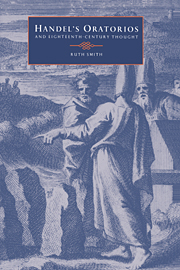Book contents
- Front Matter
- Contents
- Acknowledgements
- Abbreviations
- Introduction
- PART 1 ENGLISH ORIGINS OF ENGLISH ORATORIO
- Chapter 1 Artistic norms
- Chapter 2 The purpose of art
- Chapter 3 Music, morals and religion
- Chapter 4 The biblical sublime
- Chapter 5 The survival of epic
- Chapter 6 The defence of Christianity
- Chapter 7 Towards oratorio
- PART II THE PATRIOT LIBRETTO FROM THE EXCISE BILL TO THE JEW BILL: ISRAELITE ORATORIOS AND ENGLISH POLITICS
- Appendix I Libretto authors and sources
- Appendix 2 The oratorios and Methodism
- Notes
- Bibliography of sources cited
- Index
Chapter 5 - The survival of epic
Published online by Cambridge University Press: 22 September 2009
- Front Matter
- Contents
- Acknowledgements
- Abbreviations
- Introduction
- PART 1 ENGLISH ORIGINS OF ENGLISH ORATORIO
- Chapter 1 Artistic norms
- Chapter 2 The purpose of art
- Chapter 3 Music, morals and religion
- Chapter 4 The biblical sublime
- Chapter 5 The survival of epic
- Chapter 6 The defence of Christianity
- Chapter 7 Towards oratorio
- PART II THE PATRIOT LIBRETTO FROM THE EXCISE BILL TO THE JEW BILL: ISRAELITE ORATORIOS AND ENGLISH POLITICS
- Appendix I Libretto authors and sources
- Appendix 2 The oratorios and Methodism
- Notes
- Bibliography of sources cited
- Index
Summary
In the opinion of eighteenth-century writers the most fitting vehicle of the religious sublime was the epic, established since Homer and ratified by Milton as the noblest literary form, and defined by Dryden as ‘the greatest work that the soul of man is capable to perform’, a definition kept alive by eighteenth-century literary authorities. Religious nationalism is a prominent feature of the oratorios, and for many twentieth-century audiences a tiresome one. Eighteenth-century prescriptions for epic form a critical context which makes the librettos' insistent religious nationalism seem more conventional than we might suppose but also less superficial. ‘National song’ was a morally and idealistically loaded endeavour. Despite or perhaps because of the aspirations of its advocates, it was a lost cause in Augustan literature. But, point for point, contemporary prescriptions for epic can be matched in the librettos, finding in Handel's oratorios the realisation they never achieved in poetry.
The epic for which writers campaigned was moral, didactic, elevating and Christian. The purpose of epic, according to Sir Richard Blackmore (one of its most prolific eighteenth-century practitioners), is to teach virtue and glorify the nation, so it must exhibit and respect the national religion. His own Alfred (1723), dedicated with educational intent to Frederick Prince of Wales, ‘is contrived and finished upon the system of the Christian Institution, the established Religion of my Country, and which I my self sincerely believe’.
- Type
- Chapter
- Information
- Handel's Oratorios and Eighteenth-Century Thought , pp. 127 - 140Publisher: Cambridge University PressPrint publication year: 1995

